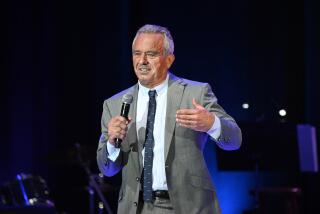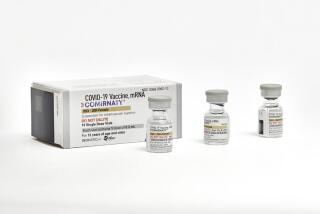Reopening Debate on Medical Errors
Last November, a committee of scientists presented the public with shocking data: that medical errors kill tens of thousands of people--as many as 98,000--in the U.S. every year.
Now a group of Indiana scientists, writing in today’s issue of the Journal of the American Medical Assn., says those numbers were highly exaggerated.
The high estimates, they write, assumed that, every time someone died and a medical error had occurred, the error was the cause of death. In fact, they argue, many deaths may have had nothing to do with the errors.
The scientists, of the Regenstrief Institute, a research institute, and Indiana University, both in Indianapolis, suspect the death toll from errors is in fact very small.
In a rebuttal, also published today in JAMA, Harvard scientist Dr. Lucian L. Leape, a member of the committee that released last year’s report, wrote that the Indiana analysis is flawed--and that, if anything, the committee’s numbers underestimate the problem.
Last November’s report from the National Academy of Sciences’ Institute of Medicine cast a spotlight on the problem of medical errors by citing two large studies. Both had carefully examined medical records of thousands of hospital patients who died or had problems during their stays, such as a sudden return to intensive care.
Extrapolating from the number of treatment errors found, one study concluded that 44,000 U.S. deaths annually might be associated with medical errors, also known as “adverse events.” The other study’s number was higher: 98,000. Either figure would mean medical errors outstrip highway accidents, breast cancer and AIDS as a cause of death in the United States.
Errors--which include everything from giving the wrong dose of drug to removing the wrong body part--aren’t generally caused by sloppiness, the Institute of Medicine stressed. Rather, the medical system is at fault, lacking enough built-in ways to prevent or catch mistakes.
Dr. Clement J. McDonald, director of the Regenstrief Institute and coauthor with Dr. Michael Weiner and Siu L. Hui of the JAMA article that questioned the November figures, says that the furor following the Institute of Medicine report inspired him to reexamine the data.
“The numbers just seemed really extreme,” he says. “In a hospital, you hear about problems here or there, but the numbers seemed out of balance with that.”
McDonald and colleagues note that in neither study had the scientists figured out how many patients would have died had no errors occurred--an important assessment, he says, since these patients were a pretty sick group of people. Therefore it really wasn’t possible for the scientists to know how many “excess” deaths the errors had caused.
But Leape, an adjunct professor of health policy at the Harvard School of Public Health and an author of one of the papers, says he personally spent much time studying medical records to assess whether errors probably caused patients’ deaths or not--and concluded that, 80% of the time, they probably did.
“It’s not true that most of the people would have died anyway--he’s just plain wrong,” Leape says.
In fact, Leape estimates that the U.S. death toll from medical errors is probably even higher than 98,000. The two studies focus on hospital errors and don’t include medical errors in the many procedures performed outside hospital walls.
Also, the studies detected only medical errors written on patients’ charts. Many errors aren’t recorded.
Dr. Troyen Brennan, professor of medicine at Harvard Medical School, says it’s likely that the range of 44,000 to 98,000 is accurate. An author of both studies, he says that a reexamination of data from one of them (which used hospital data from Colorado and Utah) to figure out how many people would have died lowers the error death toll only 20% to 30%.
Dr. Robert Brook, professor of medicine at UCLA and vice president of Rand, a Santa Monica-based nonprofit think tank, points out that the numbers can never be known for sure.
Yet he believes the Institute of Medicine may underestimate the number of errors. Brook’s studies on hospital care of elderly people suggest a death toll from errors that may easily exceed 98,000 a year.
The absolute figure doesn’t really matter that much, Leape says: The important thing is that changes are afoot in the medical profession to render the U.S. health system more foolproof.






